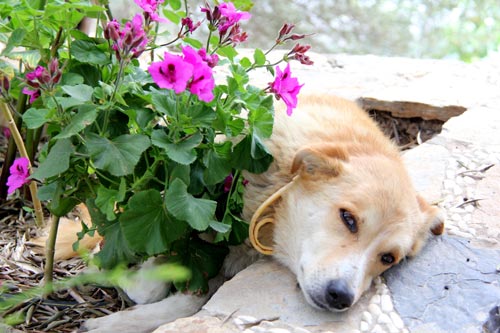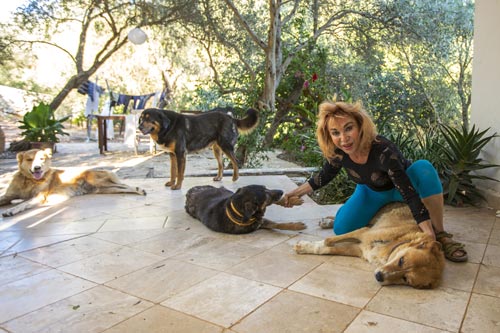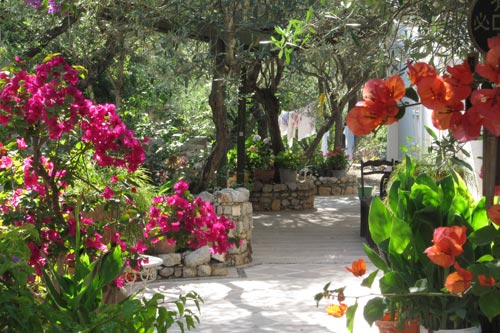


In creating Health and Yoga Holidays in Turkey our wish is to encourage a holistic way of daily life. As yoga teachers and practitioners we believe in the oneness of all beings, human, animal and mother earth.
We organize yoga holidays to practise yoga, meditation and healing treatments in a safe, friendly and beautiful environment. The purpose is also to introduce people to the culture, traditions and diverse landscape of Southwest Turkey. The yoga that we practise and teach is a yoga of service to the community (karma yoga) as well as helping people to their greatest health and effectiveness though their physical practice.

The Yoga Centre in Gölköy supports the local community directly by housing participants in small, family-run hotels, by training clever local women as cooks, by encouraging their literacy and by employing other occasional craftsmen and assistants from the village. We also offer treatments to the local community when required. The local economy benefits from the presence of the yoga centre and its visitors using the shops, restaurants and taxis, especially since we run most of our courses in the low season when there is hardly any trade. The taxi drivers are happy that we have put Gölköy on the map for them.
The only local transport is by road, so we encourage people to share rides as far as possible especially to and from the airport. The Turkish 'dolmush', or 'filled taxi', is a wonderful institution that maximizes vehicle capacity and encourages the sharing spirit.
All our food is bought from local markets, ensuring freshness, encouraging organic production and supporting the small farmers of the region.
Walking the Path of Your Spirit
The Yoga Centre in Gölköy nestles next to the pine forests outside the village on a hillside, overlooking a little valley with a small lake and a unique palm grove close to the sea. We are active in preserving all this natural beauty.
These evergreen forests are a habitat and shelter for foxes, jackals, wild boar, snakes, tortoises, chameleons and rare birds. The greatest danger to the forests in our area is the summer fires. We keep a vigilant eye out for any irresponsible people barbecuing, or ‘clearing rubbish by burning’ in the vulnerable areas. In the past we have seen 3 forest fires and we have helped with the replanting of trees after them.
Conserving water is important in this climate since it does not rain for 6 months of the year. We save rainwater in a tank under the house and plant drought-resistant plants in the garden such as cactus and bougainvillea. The traditional way of collecting rainwater is in deep circular cisterns with domed roofs, called ‘gümbet’. You can still see them here and there since they are still in use. We do not to plant anything that requires a lot of water, such as grass (referred to as 'green cancer').
“Stiram sukham asanam: the Asana connection to the earth is steady and joyful. Yoga philosophy reveals that for our relationship to all creatures to be steady and joyful it must be mutually beneficial. Mother Earth does not belong to us. We ultimately will not benefit from exploiting her for short-sighted gains.”
“How we treat the world around us, how we treat all beings, human and animal has a bearing on our own happiness as a member of the community of life. When we feel our connection to the earth through our body we become confident, serene and peaceful. As a result we are less likely to hurt others through harmful thoughts, cruel words and violent deeds.” David Life and Sharon Gannon, Jivamukti Yoga.
Patanjali’s principle of Ahimsa is of non-violence to people, animals and nature. To harm other creatures or the environment is to harm oneself.



Our rubbish goes to recycling bins and the organic waste, such as vegetable peelings, is cooked into the dogs’ meals or is composted. Used water is collected in a septic tank and soaks away through the rocky earth. Most people in the whole area use solar panels for water heating.
The local government wanted to make the wetland area by the lake into a golf course. However, a local environmental group, in which we are active, campaigned successfully to preserve this area with its lake and palm forest as a nature park. Our walking groups are led respectfully through the landscape by experienced guides who love the wild beauty and are careful to ensure that it is not harmed.
Another group that we are actively involved with is the local animal rights association. This group has ensured that stray dogs are not simply poisoned, as in the past. A rescue centre has been set up, supported by frequent funding events. Abandoned puppies and injured dogs are cared for and females are spayed to reduce the spread of uncared-for animals. We have 6 rescued dogs living with us as a much-loved part of the family.
This association provides a shelter for stray dogs and cats with a mobile clinic and a vet. Vaccination and neutering. Education of children to open up their compassionate spirit. Our guests often go to fundraising activities of this group.
www.cydd.org.tr - Çagdas Yasami Destekleme Dernegi
An association for the support of contemporary living. This Turkish cultural foundation project sends girls to school. When educated they don’t wear headscarves and are more integrated into modern Turkey. It is the voice of Atatürk: progressive Turkey. Pervin has run classes in yoga and pottery for this organization.
TEMA The Turkish Foundation for Combating Soil Erosion, for Reforestation and the Protection of Natural Habitats
Underwater Research Society in Turkey is for study and protection of the endangered Mediterranean Monk Seal. The English language version of this website is under construction, but you can find UTube video about the rescuing of orphaned monk seal pups.
World Wildlife Fund has a Turkish branch which works to protect the biological diversity of forest and seashore ecosystems and to manage natural resources intelligently. For instance, it has projects for the protection of endangered species such as turtles and seals.
Greenpeace's Turkish branch (the site is in Turkish).
Travelling to Turkey puts carbon dioxide into the atmosphere. Climatecare calculates the cost of offsetting this is £4.45 and offers you a method of paying. Offsetting means paying someone to reduce CO2 in the atmosphere by the same amount that your activities add. In this way you can 'neutralise' or 'balance' the CO2 added by your activities.
Climate Care offsets your CO2 by funding projects around the world. These can be in: